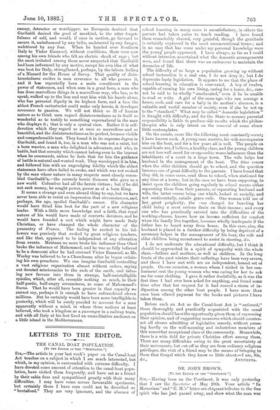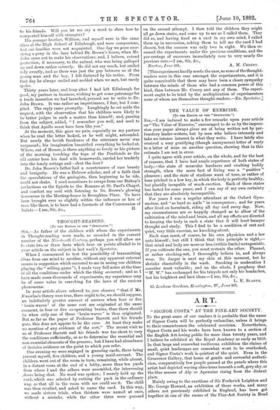DR. JOHN BROWN.
(To TIIE EDITOR OF TUE "SPECTATOR.")
Six,—Having been on the Continent, it was only yesterday that I saw the Spectator of May 20th. Your article "In Memoriam" and "E. M.'s" letter are eldquent tributes to the fine spirit who has just passed away, and show what the man was
'to his friends. Will you let me say a word to show how he comported himself with strangers? His younger brother, William, and myself were in the same • class at the High School of Edinburgh, and were companions, but our families were not acquainted. One day we Fere ever- • cising a pony in the • lane behind Dr. Brown's house, when Mr. John came out to make his observations, and, I believe, extend protection, if necessary, to the animal, who was being galloped up and down rather severely. He did not say much, but smiled very sweetly, and as there was just the gap between us of the young man and the boy, I felt flattered by his notice. From that day he always smiled and nodded when we met, but rarely spoke.
Thirty years later, and long after I had left Edinburgh for good, my partner in business, wishing to get some patronage for a trade invention we had launched, pressed me to write to Dr. John Brown. It was rather an impertinence, I fear, but I com- plied. The reply came promptly. Laughingly he set aside the request, with the observation that his children were likely to be better judges in such a matter than himself; and, passing from the subject, added, "I remember you well, and used to think that Apollo must have been like you."
At the moment, this gave me path, especially as my partner when he read the letter looked, as he well might, astounded. But surely the lavish frankness of the utterance never was surpassed ; his imagination beautified everything he looked at. Where, out of Homer, is there anything so lovely as his picture of the morning touching the tops of the Pentlands as the old carrier bore his dead wife homewards, carried her tenderly into the lonely cottage and—shut the door?
Dr. John Brown's father had a countenance of rare beauty and benignity. He was a Hebrew scholar, and of a faith that the speculations of the geologists, then beginning to be rife, could not shake. I used sometimes to escape from our Bishop's prelections on the Epistle to the Romans at St. Paul's Chapel, and comfort my soul with listening to Dr. Brown's glowing 'discourses in the Meeting-house in Broughton Place. To have been brought ever so slightly within the influence or ken of men like these, is to have had a foretaste of the Communion of





































 Previous page
Previous page